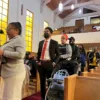In many Canadian churches today, it is common to hear a land acknowledgment at the start of a service. It’s a way to recognize the First Nations who occupied the land.
Three Mennonite churches in Winnipeg, Man., and one in Kitchener, Ont., have taken that a step further by deciding to pay reparations to Indigenous people on whose land their buildings are located.
In so doing, they take inspiration from Adrian Jacobs, senior leader for Indigenous Justice and Reconciliation in the Christian Reformed Church in Canada.
Jacobs is a member of the Six Nations Haudenosaunee Confederacy of the Grand River Territory in Ontario who also worked for Mennonite Central Committee Ontario. For some years he has proposed that churches pay a symbolic amount to work at reconciliation with Indigenous people.
“It would be a spiritual covenant with local Indigenous people, a treaty between people with respect to the land,” he said.
Jacobs suggests that churches do this by annually donating 1% of their budget, or of the value of their property, to local Indigenous-led organizations. It is a way to recognize what was lost by the original occupants of the land through broken treaties.
So far, four congregations, all of them part of Mennonite Church Canada, have taken up his call.
“Mennonite churches have been the most responsive,” Jacobs said.
In Winnipeg, Home Street Mennonite Church donates 1% of its budget to two local Indigenous organizations.
The church’s $3,600 payment is placed in the larger context of “settler colonialism, including the theft and dispossession of Indigenous land and the near-erasure of Indigenous people from that land,” said Esther Epp-Tiessen, who is part of Home Street’s Indigenous-settler relations committee.
The church was built in 1920 on land once owned by a Métis family. Epp-Tiessen said the congregation seeks to acknowledge this context in a tangible way by paying reparations.
The money is going to two Indigenous-led organizations. “They are groups we have a relationship with,” she said. “They are doing marvelous work in the community.”
For the church, “this isn’t about a charitable donation from our benevolence,” she added. “It’s a powerful symbol of a commitment to be treaty people. It is money that is owing.”
Also making reparations is Charleswood Mennonite Church, located on land in Winnipeg once used by Indigenous people for hunting and trapping. After adopting a statement of reconciliation in 2021, the congregation decided to act on it by giving 1% of its annual budget, about $3,600, to local Indigenous organizations.
“We decided to give it in an open-handed way,” said Jonathan Neufeld, co-pastor. “No strings attached.”
For the church, it’s a way to go beyond a land acknowledgment by “tangibly showing we have benefited from this land as a church and individuals,” he said.
Since 2022, Hope Mennonite Church in Winnipeg has been giving a combination of 1% of the value of the rooms it rents at a local church, plus 1% of its budget, to local Indigenous organizations.
“We realize that reparations are something that we should and need to do,” said Lynell Bergen, lead pastor. The congregation contributes about $2,500 per year.
In Kitchener, Ont., Stirling Mennonite Church has been paying 1% of its annual budget, about $4,000, since 2021.
“We had been talking about it for many years,” said Josie Winterfeld, pastor for missions, peace and justice and outreach. “We’ve been learning, growing and working into it.”
The church is located on Block Two of the Haldimand Tract, which was proclaimed in 1874. Indigenous people who were part of Six Nations were told they would receive lease payments from those who came to reside on the tract. That never happened.
“We looked at the treaty, all the things that were forgotten,” Winterfield said of the decision to pay reparations. Their payment is given to a nearby Indigenous-run organization that seeks to preserve and promote Indigenous knowledge.
The symbolic payment “doesn’t come close to what they lost. It’s about learning to live in a good way with Indigenous neighbors,” she said.



